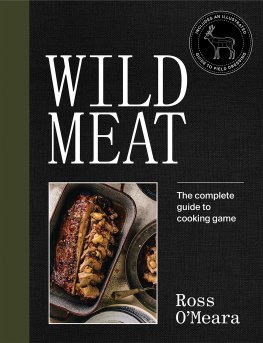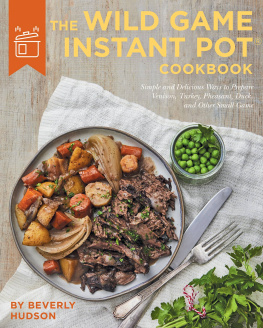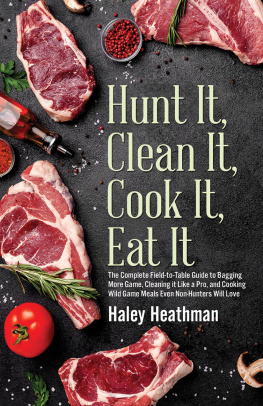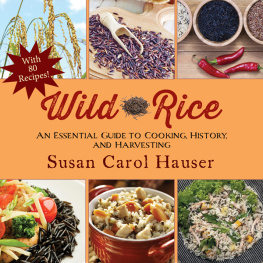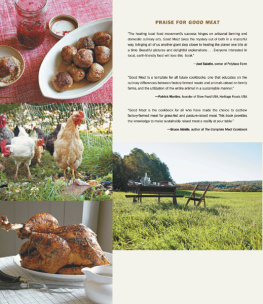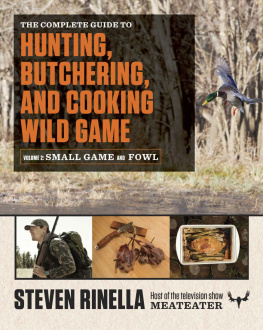Ross OMeara - Wild Meat - The Complete Fuide to Cooking Game
Here you can read online Ross OMeara - Wild Meat - The Complete Fuide to Cooking Game full text of the book (entire story) in english for free. Download pdf and epub, get meaning, cover and reviews about this ebook. year: 2022, publisher: Hardie Grant Books, genre: Home and family. Description of the work, (preface) as well as reviews are available. Best literature library LitArk.com created for fans of good reading and offers a wide selection of genres:
Romance novel
Science fiction
Adventure
Detective
Science
History
Home and family
Prose
Art
Politics
Computer
Non-fiction
Religion
Business
Children
Humor
Choose a favorite category and find really read worthwhile books. Enjoy immersion in the world of imagination, feel the emotions of the characters or learn something new for yourself, make an fascinating discovery.
- Book:Wild Meat - The Complete Fuide to Cooking Game
- Author:
- Publisher:Hardie Grant Books
- Genre:
- Year:2022
- Rating:3 / 5
- Favourites:Add to favourites
- Your mark:
- 60
- 1
- 2
- 3
- 4
- 5
Wild Meat - The Complete Fuide to Cooking Game: summary, description and annotation
We offer to read an annotation, description, summary or preface (depends on what the author of the book "Wild Meat - The Complete Fuide to Cooking Game" wrote himself). If you haven't found the necessary information about the book — write in the comments, we will try to find it.
Wild Meat - The Complete Fuide to Cooking Game — read online for free the complete book (whole text) full work
Below is the text of the book, divided by pages. System saving the place of the last page read, allows you to conveniently read the book "Wild Meat - The Complete Fuide to Cooking Game" online for free, without having to search again every time where you left off. Put a bookmark, and you can go to the page where you finished reading at any time.
Font size:
Interval:
Bookmark:






CONTENTS

I wasnt born into a hunting family. Dad is from
country Australia and Mum is from the city. I was
drawn to hunting over the years, by following my
food chain as a chef, in an attempt to get to the
roots of where my food came from. My godfather,
Lyall Crockford, was the major influence in getting
me started with hunting. And good friend Alex
Zacharewicz ( aka The Russian) mentored me
into the hunter I am today.
These days, many of us eat meat that we are
not connected to. A lot of people wont ever realise
where it came from, or how it came onto their plates.
As a chef, I was dealing with produce every
day, but then I started to break it down. I wanted
to know how everything I was using in the kitchen
was produced, from cheese to charcuterie and
preserves, and that then led me to protein. I wanted
to know why great pork was great, and what made
a good chicken good. Why is wild game so much
better than farmed game? The main difference
is in how you harvest it, and the environment
you take it from.
People have hunted for thousands of
years. Its a skill that a few have kept, but
most of us have lost due to the way our
lives are lived these days. In the past, a
hunt, when successful, was a celebration,
as it meant survival for another day or
even better, preparation for the winter
and lean times ahead.

has also managed to keep hunting sustainable
as a food source.
Australia has many environmentally damaging
introduced species that need to be controlled,
as well as a few native species but we need to
start actually using this protein, rather than culling
and simply leaving it. Most Australians would
hate to admit it, but New Zealand is so far in front
of us when it comes to game management, with
New Zealanders having embraced the hunting
harvesting lifestyle and utilising its game as
a resource.
As a hunter with a food background, I have
compiled this book of wild game recipes with the
idea of also giving hunters, from novices to old
hands, knowledge about the breakdown of the
animals they harvest in the field. Some will have their
own methods and may not agree with what I have
put down in these pages, but there are so many ways
to approach field harvesting to get the same result.
I dont declare myself to be an expert, but I have
worked with food all my working life, and I take an
approach that I hope many will find accessible.
The recipes themselves are very approachable,
with a strong theme of making things from scratch.
I have also linked the selected animal species
covered in this book with similar or comparable
species from other parts of the world to substitute
in the recipes.
As hunters, we are custodians of the bush.
There may be a bit of earnestness in my words,
but I do believe that the more we take responsibility
for the meat we eat, and for our whole food chain
generally, the better off we will all be. And what
better than free- range, cruelty- free, organic,
hormone- free, grass- fed protein, which helps keep
our natural ecosystems in balance and conserve
our parks and wild lands around the globe.
I had a time in my life when I took full responsibility
for my familys food production. For years, we
had a small- hold farm on Bruny Island, off southern
Tasmania, where we raised and harvested all our
own protein. And since I am a bad gardener, we
swapped vegies for meat. We raised old- breed,
free- range pigs, which I processed into old- style
charcuterie, and some we sold as fresh pork. We
had just enough sheep to keep the paddock under
control, and some goats for a while, until they got the
better of us. Chickens were great for eggs and
the odd dinner, and partridge came and went.
Then I would hunt for deer, rabbits, possum,
hare and goats.
When I first started hunting, I called myself a
game harvester, as I looked at game only as meat
that I was accessing for my own consumption, or for
commercial sale. These days, I consider myself a
hunter, as I am more inclined to manage the areas
I hunt. I dont have the need to take just any animal
that I see, and I now feed my family and others with
the meat that I harvest in the field. As hunters, I feel
we have a responsibility to sustain this resource for
future generations.
North America has implemented great hunting
management with their tag system, which helps
with the conservation of species and keeps the
wildlife abundant. I havent made the trip to hunt
over there yet, but hope to visit soon. Europe, with
its deeply embedded hunting traditions and history,
I THINK, BACK THEN, IT WOULDVE
BEEN [ MORE] ABOUT THE PRODUCT,
WHICH IS THE WAY WERE TURNING
THESE DAYS. PEOPLE ARE RELYING
ON BETTER- QUALITY MEAT AND
DOING AS LITTLE AS POSSIBLE
TO IT.
Ready for the hunt


Sambar deer grazing

Backfat
The top layer of fat of a pig,
starting at the neck and
finishing at the shoulders.
Bakers flour
This type of flour has a higher
protein content than regular
flour. It is also known as
strong flour or bread flour.
Caping
Refers to the act of skinning
an animal for a trophy mount.
Caul fat
The fat that surrounds the
internal organs of animals.
It is also called lace fat and
crpinette. In Europe, it is
used to keep meat moist
during cooking and roasting.
If you cant get it, you can use
streaky bacon or prosciutto.
Cultured butter
Butter that has had the cream
fermented before the churning
process, resulting in a richer
and more tangy flavour.
Dressing
The act of removing the pelt
or skin from a carcass.
Lard
Rendered- down animal fat,
which is widely available in
supermarkets these days.
Pure sea salt
Less refined than table salt,
pure sea salt doesnt contain
anti- caking agents.
Salt, for seasoning
As a golden rule, the perfect
amount of salt for burgers,
Font size:
Interval:
Bookmark:
Similar books «Wild Meat - The Complete Fuide to Cooking Game»
Look at similar books to Wild Meat - The Complete Fuide to Cooking Game. We have selected literature similar in name and meaning in the hope of providing readers with more options to find new, interesting, not yet read works.
Discussion, reviews of the book Wild Meat - The Complete Fuide to Cooking Game and just readers' own opinions. Leave your comments, write what you think about the work, its meaning or the main characters. Specify what exactly you liked and what you didn't like, and why you think so.

